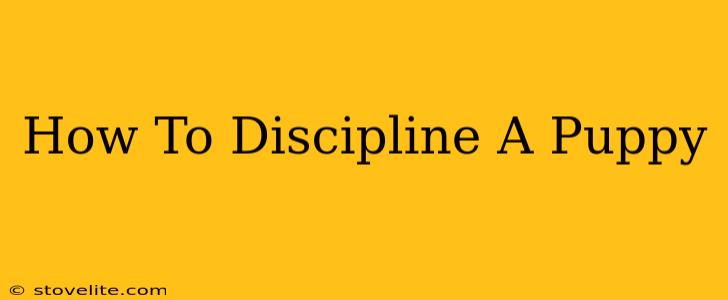Bringing a new puppy home is incredibly exciting, but it also comes with the responsibility of teaching them good manners and appropriate behavior. Discipline isn't about punishment; it's about consistent training using positive reinforcement to shape your puppy's behavior. This guide will provide you with effective strategies for disciplining your puppy without resorting to harsh methods.
Understanding Puppy Behavior
Before diving into discipline techniques, it's crucial to understand why puppies misbehave. Puppies aren't deliberately trying to be naughty; they're still learning. Common misbehaviors like chewing, nipping, and accidents stem from:
- Teething: Puppies' gums are sore, leading to chewing on everything.
- Exploration: They explore the world through their mouths.
- Lack of housetraining: They haven't yet learned to control their bladders and bowels.
- Fear or anxiety: Unfamiliar situations can trigger unwanted behaviors.
- Energy levels: A bored or overly energetic puppy is more likely to misbehave.
Understanding these reasons helps you address the root cause of the problem, rather than just reacting to the symptom.
Positive Reinforcement: The Key to Success
Positive reinforcement is the cornerstone of effective puppy discipline. It focuses on rewarding desired behaviors, making them more likely to be repeated. This involves:
- Consistent commands: Use clear, concise commands like "sit," "stay," and "come."
- Immediate rewards: Reward your puppy immediately after they perform the desired behavior with treats, praise, or toys.
- Patience: Consistency and patience are key. It takes time and repetition for puppies to learn.
- Positive feedback: Always praise your puppy for good behavior. A happy tone of voice works wonders.
Addressing Common Puppy Problems
Here's how to tackle some common puppy misbehaviors using positive reinforcement:
1. Excessive Chewing:
- Provide appropriate chew toys: Offer a variety of safe and engaging chew toys.
- Redirect chewing: When your puppy chews on something inappropriate, immediately redirect them to a chew toy and praise them for chewing on the toy.
- Make inappropriate items unappealing: Use bitter apple spray on items you don't want your puppy to chew.
- Supervise your puppy: Keep a close eye on your puppy, especially when they're unsupervised.
2. Nipping and Biting:
- Yelp like a puppy: When your puppy nips, let out a high-pitched yelp to mimic a puppy's pain. This often startles them and discourages biting.
- Ignore the nipping: Sometimes, ignoring the nipping is effective. When your puppy stops nipping, give positive reinforcement.
- Provide appropriate chewing alternatives: Offer chew toys to satisfy their need to bite and chew.
3. House Training Accidents:
- Establish a routine: Take your puppy out frequently, especially after waking up, eating, and playing.
- Positive reinforcement for successful potty breaks: Reward your puppy immediately after they eliminate outside.
- Clean up accidents thoroughly: Use an enzymatic cleaner to remove any scent that might attract your puppy back to the same spot.
- Never punish your puppy for accidents: Punishment can create fear and anxiety, making housetraining more difficult.
4. Jumping:
- Ignore the jumping: Turn your back and ignore your puppy when they jump.
- Reward calm behavior: When your puppy has all four paws on the ground, praise and reward them.
- Teach an alternative behavior: Teach your puppy to sit or shake hands instead of jumping.
Creating a Positive and Predictable Environment
A structured environment is essential for a well-behaved puppy. This includes:
- Regular exercise: Tire your puppy out with regular walks and playtime to reduce pent-up energy.
- Mental stimulation: Engage your puppy with puzzle toys and training sessions to prevent boredom.
- Consistent rules: Everyone in the household should follow the same rules and training methods.
- Socialization: Expose your puppy to various people, animals, and environments to help them develop good social skills.
Disciplining a puppy is a journey, not a destination. Remember to be patient, consistent, and focus on positive reinforcement. By understanding your puppy's needs and using these techniques, you can create a happy and well-behaved companion for years to come.

